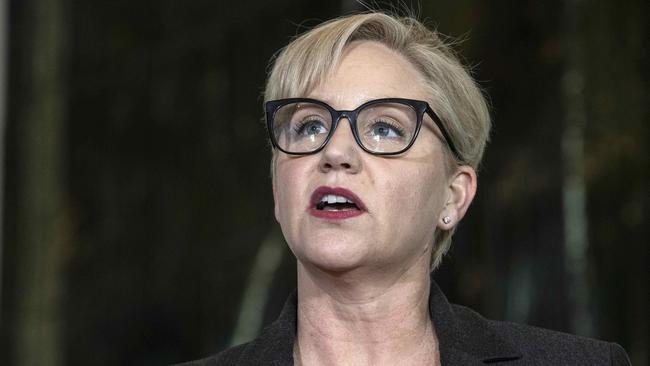Star Entertainment faces fines totalling hundreds of millions of dollars over ‘innumerable’ money laundering breaches
The financial crimes watchdog has court action against Star Entertainment, accusing it of exposing its casinos and Australia’s financial system to organised crime.

Business
Don't miss out on the headlines from Business. Followed categories will be added to My News.
Austrac has put Australian casinos on notice as it seeks potentially hundreds of millions of dollars of fines from Star Entertainment in its second high-profile court case against a gaming group.
On Wednesday, the financial crimes regulator launched civil proceedings against Star in the Federal Court, accusing the company of “innumerable” and systemic breaches of anti-money laundering and counter-terrorism financing laws.
In a statement of claim, totalling more than 2000 pages, Austrac alleges “widespread non-compliance”, which led to Star’s Sydney and Queensland casinos being exposed to infiltration from organised crime gangs.
It comes after the regulator launched separate action against Star’s bigger rival Crown Resorts earlier this year, as it extends its pursuit of blockbuster fines from the big banks to casino giants.
Austrac chief executive Nicole Rose said casinos must take their anti-money laundering obligations seriously to protect the community and financial system from criminal exploitation.
“Criminals will always seek to exploit the financial system to launder their money and harm the community. Businesses, as the front line of defence of our financial system and our communities, are often the first to be alerted to criminal activity,” Ms Rose said.
“Austrac’s investigation identified a multitude of issues including poor governance and failures of risk management and to have and maintain a compliant AML/CTF program.
“The Star entities also failed to carry out appropriate ongoing customer due diligence which has led to widespread and serious non-compliance over a number of years.”
Ms Rose would not comment on the quantum of the potential fine, saying it was a matter before the court. But in court documents, Austrac said Star had breached the AML/CTF Act innumerable times, with each contravention attracting a maximum penalty of $22.2m.
“Star Sydney and Star Queensland have accordingly provided designated services in contravention of section 81 (of the Anti-Money Laundering and Counter-Terrorism Financing Act) on and from November 30, 2016. These contraventions are too numerous to quantify and are ongoing.”
Meanwhile, Crown has posted a near $1bn loss as it sets aside more than $600m to pay for fines levied by gaming regulators.
Star chief executive Robbie Cooke said: “Our goal is to earn back the trust and confidence of Austrac and all our regulators”.
“We are transforming our culture, transforming our business,” Mr Cooke said.
“We are committed to improvement but there is a lot still to do. We will continue to work with Austrac as we build a better, stronger and more sustainable company.”

The Austrac action is on top of the $100m fine NSW’s new Independent Casino Commission issued Star last month after it suspended its casino licence.
The fine followed an inquiry, headed by Adam Bell SC, which found the company had set up an “inherently deceptive and unethical process” disguising almost $1bn as hotel expenses to allow wealthy Chinese patrons to gamble, failed to check the source of the money – and knew for years it was in breach of the rules.
Star said in September it was in “contact with its lenders and would seek additional waivers or amendments if required”, like it did during the onset of Covid-19, ahead of potential regulatory fines.
In its latest accounts, Star has $82m in cash and can access $356m across its debt facilities, “all of which has maturities beyond 12 months”. It also expects to reap $248m in cash from the sale of the Treasury building in Queensland.
Austrac said Star failed to assess AML/CTF risks and install an “appropriate framework” for board and senior management oversight; did not monitor transactions, including potentially suspicious activity, and failed to perform customer due diligence to ensure funds transacted across its casinos were clean.
The Bell inquiry also found that instead of shutting down junkets bringing in major overseas gamblers, Star allowed them to continue to operate – “a collective decision by the senior management … which reflected a culture in which business goals were given undue priority over regulatory and money laundering and terrorism financing risks”.
A separate inquiry in Queensland has also found Star unfit to hold a casino licence in the state, after revealing the company not only allowed, but paid, for patrons banned in NSW to travel to its Brisbane and Gold Coast casinos to gamble, showing a “lively disregard for the law”.
Morningstar analyst Angus Hewitt said: “We think investors should require an additional margin of safety amid current regulatory uncertainty around Star‘s casino licences”.
“But we continue to expect Star to eventually prove suitability and ultimately maintain its casino licences in both states. Indeed, the NSW regulator noted that with appropriate remedial action, it expects Star should be permitted to return to gaming in accordance with the provisions of its casino licence,” Mr Hewitt said in a note to investors.
“At current prices, we think Star offers a good opportunity to capitalise on overblown pessimism.”
Star’s share price firmed 0.3 per cent to $2.71 on Wednesday, giving it a market value of $2.58bn. In the past year, its shares have dived more than 23.6 per cent, with most of its board and senior leadership resigning.
Originally published as Star Entertainment faces fines totalling hundreds of millions of dollars over ‘innumerable’ money laundering breaches





